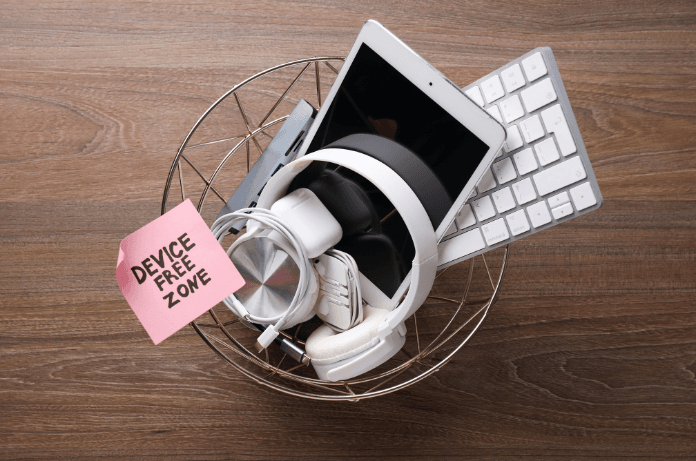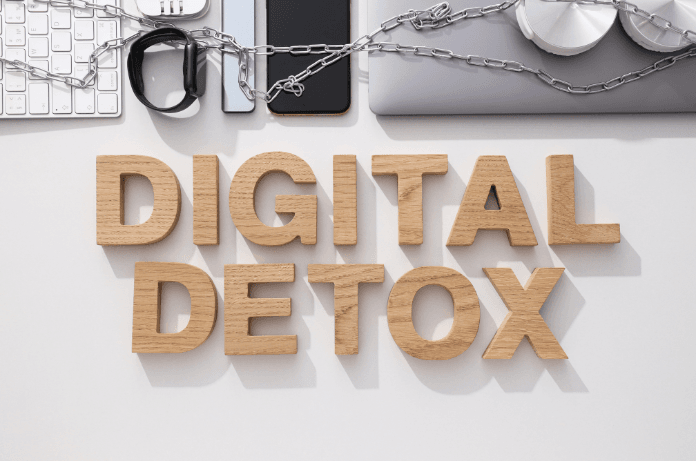
Do you ever catch yourself mindlessly scrolling, only to realize hours have vanished into the digital abyss? You are not alone. Studies have shown that 61% of people confess to feeling hooked on their screens, tethered to an endless stream of notifications and updates.
But here’s the catch: while we stay endlessly connected, we unknowingly drain our mental energy, overwhelming our senses and diminishing the quality of our daily lives. That’s where the beauty of a digital detox steps in—a purposeful pause from the digital noise that allows you to reclaim your time, recharge your mind, and rediscover what it means to be present.
Whether it’s cutting down on social media or going completely offline, this conscious break could be the reset your brain has been craving. And in a world that’s always on, taking time to unplug might just be the most powerful way to reconnect with yourself.
The digital detox you didn’t know you needed
In today’s hyperconnected world, our devices have become like an extra limb. From the moment we wake up to the time we go to bed, our phones, tablets, and laptops demand our constant attention. But while technology brings convenience, it can also lead to digital overload—an endless stream of pings, notifications, and updates that keep us perpetually wired and often overwhelmed.
That’s where the concept of a digital detox steps in. A digital detox is more than just a trendy term; it’s an intentional break from our screens—a moment to unplug, breathe, and reclaim balance in a tech-driven life. Why is it important? Because studies have shown that constant screen time overstimulates our brains, leading to stress, anxiety, and even feelings of inadequacy. The endless scrolling, constant notifications, and bombardment of information leave us mentally drained, craving the simple pleasure of disconnecting.
The reality is, we’ve become dependent on technology to the point where it’s shaping our mental landscape. Taking a deliberate break from our screens isn’t just about avoiding burnout—it’s about rediscovering clarity, focus, and a sense of calm that often gets buried beneath the noise. In a world that’s constantly “on,” a digital detox gives your mind the chance to reset and refocus.
How digital overload impacts your mental health
We live in a world where everything is just a tap away. But while that constant connection may seem convenient, it’s quietly taking a toll on our mental well-being. Let’s take a closer look at how our screen habits are silently shaping our minds.
Stress and anxiety: The unseen pressure to stay connected
From the moment we wake up, our phones greet us with a flood of notifications—emails, messages, social media updates—each demanding our attention. This endless barrage of information creates an invisible pressure to stay connected 24/7. Over time, this constant need to keep up can trigger heightened levels of stress and anxiety, leaving us feeling stretched too thin. The need to respond, engage, and be “always on” can become exhausting, draining both mental and emotional energy.
Sleep disruption: Your screens are stealing your sleep
Ever scrolled through your phone late at night, only to realize it’s past midnight? You’re not alone. The blue light emitted from screens tricks your brain into thinking it’s still daytime, delaying the release of melatonin, the hormone that signals it’s time to sleep. This constant engagement with screens before bed not only disrupts your sleep quality but also throws off your natural circadian rhythm. The result? You wake up groggy, unrestrained, and less equipped to handle daily stress, setting off a cycle that’s hard to break.
FOMO: The anxiety of always being left out
In a world where social media never sleeps, it’s easy to fall into the trap of FOMO—Fear of Missing Out. The urge to stay updated on the lives of others can make us feel like we’re always missing out on something bigger or better. This constant comparison breeds feelings of inadequacy and insecurity, feeding into a loop of anxiety that leaves us perpetually dissatisfied with our own lives. The reality? What you see online is often a highlight reel, but our brains don’t always process it that way.
The refreshing benefits of a digital detox
Improved focus and productivity
Stepping away from constant distractions can sharpen your focus. Research shows that people who engage in a digital detox report improved concentration and productivity, allowing creativity to flow without interruption.
Better sleep quality
Reducing screen time, especially before bed, promotes healthier sleep patterns. Without the disruptive blue light, your body can properly unwind, leading to deeper, more restful sleep.
Enhanced mental clarity
Taking a break from digital overload helps clear mental clutter, allowing for sharper thinking, better decision-making, and a noticeable improvement in mood.
Reduced anxiety
By unplugging, individuals can reduce social comparison and lead a peaceful mindset.
How to master a digital detox: Simple tips for success
Set Clear Boundaries
To kickstart your digital detox, begin by establishing clear boundaries. Decide specific times during the day when you’ll completely unplug, like during meals, after work hours, or an hour before bedtime. These designated “no-screen” periods allow you to be more present in the moment and help build healthier habits. Consistency is key—setting these limits daily ensures that stepping away from technology becomes second nature, rather than a forced effort.
Use app blockers to limit distractions
If staying off your phone feels impossible, app blockers like “Freedom” or “Offtime” can be lifesavers. These tools allow you to block distracting apps and websites for specific periods, helping you reduce mindless scrolling. Studies show that people who use app blockers are 50% more likely to cut down on unnecessary screen time. By automating these boundaries, you’ll regain control over your digital habits without having to rely solely on willpower.
Schedule regular detox periods
Rather than jumping into a full-scale detox all at once, try scheduling regular, short detoxes throughout the week. For example, start with tech-free mornings on weekends or disconnecting during family time. Gradually build up to longer periods, like a full day each week. This gradual approach makes the transition smoother, avoiding the discomfort or withdrawal-like symptoms that can come with going completely offline too quickly.
Start small and increase gradually
Going cold turkey on all devices can feel overwhelming, especially if you’re used to being constantly connected. Instead of cutting everything at once, start by turning off non-essential notifications or removing apps that consume too much of your time. Slowly, you can scale back even further, adjusting to a more balanced relationship with technology. This step-by-step approach makes the detox less daunting and more sustainable in the long run.
A digital detox isn’t about giving up technology completely, but rather about finding a healthier balance in an overly connected world. By setting boundaries, embracing intentional breaks, and recognizing the impact of digital overload, you can reduce stress, improve mental clarity, and reconnect with yourself. In a world where we are constantly “on,” taking the time to unplug might be the most powerful way to recharge both mind and body. So, are you ready to give your brain the break it deserves?

